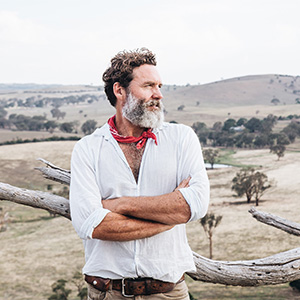Charlie Arnott
The grass is greener for Charlie Arnott
As the bearded, bandana-wearing poster child for the regenerative farming movement, Charlie Arnott's Rural Science studies at UNE in the early 1990s seem a little at odds with his current farming philosophy. He's the first to admit that, in keeping with the times, organic practices comprised a very small part of his course back then.
Still, for a young man determined to become a commodity producer of wheat, wool and beef on the family property at Boorowa, in south-eastern NSW, it was a very practical education in conventional techniques.
"Studying Rural Science at UNE made perfect sense for me," Charlie says. "It was aligned with my history and interests. I was never going to work in a lab or conduct research, but the degree certainly set me up very well by giving me a great grounding in science. At the time, it was all I knew."
Fast forward almost 30 years and much has changed, in UNE's course content, Australian farming and how Charlie approaches it. As a regenerative disciple, he now sees his job description as "growing food and feeding people" - a shift he says carries new responsibilities for animal welfare and land management.
Since 2004 he has been transitioning to regenerative practices and sharing his passion with others through social media and now a regular podcast (The Regenerative Journey) that unites producers, retailers, chefs and consumers. And he has no regrets about his formal qualification.
"Back then, we never really got to talk about how things interacted, and there are days now when I ask myself where was the symbiosis and the holistic approach?" Charlie says. "But my understanding of the science of soil biology and chemistry and physics still comes in very useful today, especially when I'm talking about agronomy, and the genetics stuff often comes flooding back."
The UNE experience provided an education in other ways, too. "It was pivotal in me developing my social skills and I have very fond memories of a lot of the people I studied with, many of whom remain friends," Charlie says. "Rural Science was challenging at times - it was a heavy workload - and the students became a pretty close-knit bunch. Interestingly, my honours thesis was on growing tomatoes using seaweed extract and I can't tell you how often seaweed comes up in the regenerative agriculture world now."
As a conventional farmer, Charlie says he regarded nature as a resource to be plundered. "I certainly didn't consider nature as my most valuable business partner, as I do now." Today, he says he has a much closer relationship with his soils, plants, animals and the food he produces. And believes there is a compelling economic, social and environmental case for this style of production.
"People who eat food, which is everyone, are asking more questions and demanding food produced this way; just note how local food systems have thrived during the COVID pandemic," Charlie says. "We eat food to improve our health, and this should be a driving factor in where and how food is grown. Increasingly, farmers are sick of using chemicals and being reliant on inputs, or seeing their paddocks blow away. Regenerative farmers are putting the culture back into agriculture."
It's as simple, Charlie says, as considering some different alternatives.
"I'm no expert on anything and I have by no means finished my education. If people ask me what I am doing, then I tell them, but I encourage them to think independently and do their own homework. However, I'm seeing more people moving into farming adopting regenerative practices, and many existing farmers transitioning, and it's giving them a lot more purpose. It's also good fun."
His fostering of "different ways of doing things that might be better for the health of farmers, their customers and the planet" has earned Charlie several major awards, including the Bob Hawke Landcare Award in 2018, and the National Carbon Cocky Award Winner for Outstanding Leadership and Conservation Farmer of the Year for the Lachlan Region, in 2011. Unofficially, he continues to serve as a Landcare Ambassador, and the 12 episodes of his weekly podcasts have proven popular.
As well as growing beef, lamb and pork, the Arnott family grows lots of trees, to prevent erosion, create wildlife corridors and provide shelter for stock. They practice low-stress handling, rotational grazing, promote perennial pasture growth and use other biodynamic methods (like cow manure concentrate) to build their soil's nutrient density.
"Regenerative agriculture is central to global health, and human health and nutrition," Charlie says. "No issues are more important than the health of our families and the health of our planet."
For this farmer, the grass is indeed greener on the other side.

